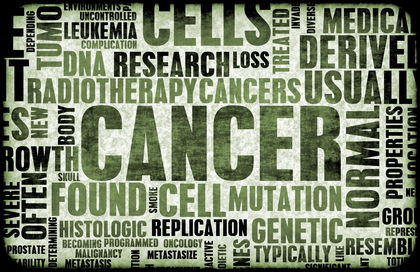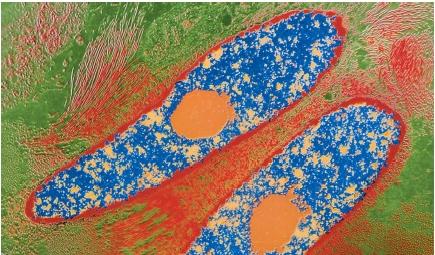Cancer

Cancer is a disease of uncontrolled cell growth caused by exposure to carcinogens (cancer-causing substances), genetic defects, or viruses. Cancer cells can multiply and form a large mass of tissue called a tumor. Some tumors are limited to one location and can be surgically removed. These tumors may cause little harm and are therefore termed benign. Cancer cells of other tumors may spread, or metastasize (muh-TASS-tuh-size), to surrounding tissue or other organs of the body. Such aggressive tumors are termed malignant. Cancer is a word used usually to describe malignant, not benign, tumors. The study of cancer is called oncology.

How cancer cells are formed
The transformation of a normal cell into a cancer cell can occur when the genetic material (deoxyribonucleic acid or DNA) of a cell is changed, or mutated. A tumor is the result of multiple gene mutations within a single cell. Years or decades before a tumor forms, a cell can become weakened by various factors, making it more susceptible to later transformation into a cancer cell. Cancer is often a disease of age, with many occurring after age fifty.
Types of cancer
There are more than 200 different types of cancer, and they are named for the organ or tissue in which they begin to grow. Leukemia refers to cancer of white blood cells (also called leukocytes), and lymphoma is cancer of lymphoid tissue (a connective tissue containing white blood cells called lymphocytes). Melanomas are cancers that begin in melanocytes (skin pigment cells). Cancers that originate in epithelial tissue (cellular tissue that lines cavities such as the stomach or lung) are called carcinomas. Those that begin in connective tissue (such as bone and cartilage) or muscle are called sarcomas.
Words to Know
Carcinogen: A substance capable of causing cancer.
Chromosome: Organized strands of DNA in the nucleus of a cell.
DNA (deoxyribonucleic acid): The genetic material in the nucleus of cells that contains information for an organism's development.
Gene: A section of a chromosome that carries instructions for the formation, functioning, and transmission of specific traits from one generation to another.
Mutation: A change in the DNA in a cell.
Tumor: A mass of abnormal tissue that can be malignant or benign.
Causes of cancer
One of the most carcinogenic substances known is tobacco smoke. It is the major cause of lung cancer, which is the leading cause of cancer deaths in both men and women in the United States. In the year 2000, almost 160,000 people in the United States died from lung cancer. In comparison, cancer of the colon and rectum caused over 56,000 deaths that same year. Breast cancer claimed over 41,000 lives, while prostate cancer claimed almost 32,000.
Other carcinogens include certain chemicals, the Sun's ultraviolet light, and radiation. Some viruses can cause cancer by altering the DNA of a host cell and converting the cell's normal genes into cancer-causing genes, or oncogenes. Genetic factors—such as chromosomal

abnormalities or the inheritance of faulty genes from a parent—can make some people more likely to develop certain cancers. For instance, people with Down syndrome, a chromosomal abnormality, are susceptible to leukemia.
Treatment
Cancer treatment consists of surgery to remove tumors and radiation to slow tumor growth. Chemotherapy, or drug therapy, is often used to treat cancers that have spread to other parts of the body. Another approach to treatment is to boost the immune system with immune-enhancing drugs or antibodies that can recognize and destroy abnormal cells. A new type of anticancer drug that homes in on cancer cells—leaving healthy ones alone—was introduced in the spring of 2001. The drug, Gleevec, works strikingly well against chronic myelogenous leukemia (one of the four main types of blood cancer) and gastrointestinal stromal tumor (GIST; a rare stomach tumor). Scientists believe the future of cancer treatment lies in the development of a wider range of anticancer drugs and in genetic engineering, whereby healthy genes would be manufactured to replace mutated DNA in transformed cells.
Prevention
Many cancers are preventable. It is estimated that avoidance of tobacco, overexposure to the Sun, high-fat diets, excessive alcohol, unsafe sex, and other known carcinogens could prevent more than 80 percent of all cancer cases. In addition, yearly testing can detect certain cancers and make early treatment possible, providing a better chance of survival.
[ See also Carcinogen ; Nucleic acid ]
Thank you,
prem, chennai
what other treatments are there...and can you explain the way the work
on the tumors/cancer cells.
I read, with interest, the article on cancer and wondered if you would mind giving me your opinion?
My Grandfathers both died of cancer, one pancreatic, the other liver. My father passed away 20 years ago at 63, with a metastised liver tumour. My brother, (there are 2 of us and he is a year my senior at 47) has recently been diagnosed with Pancreatic cancer. he is due an op soon. Would you say my chances of having inheritated the gene are high? And if so, do you think my chances of developing the disease at a later date are high? I think this is a very high probability and would appreciate your opinions.
Chris
Thanks,